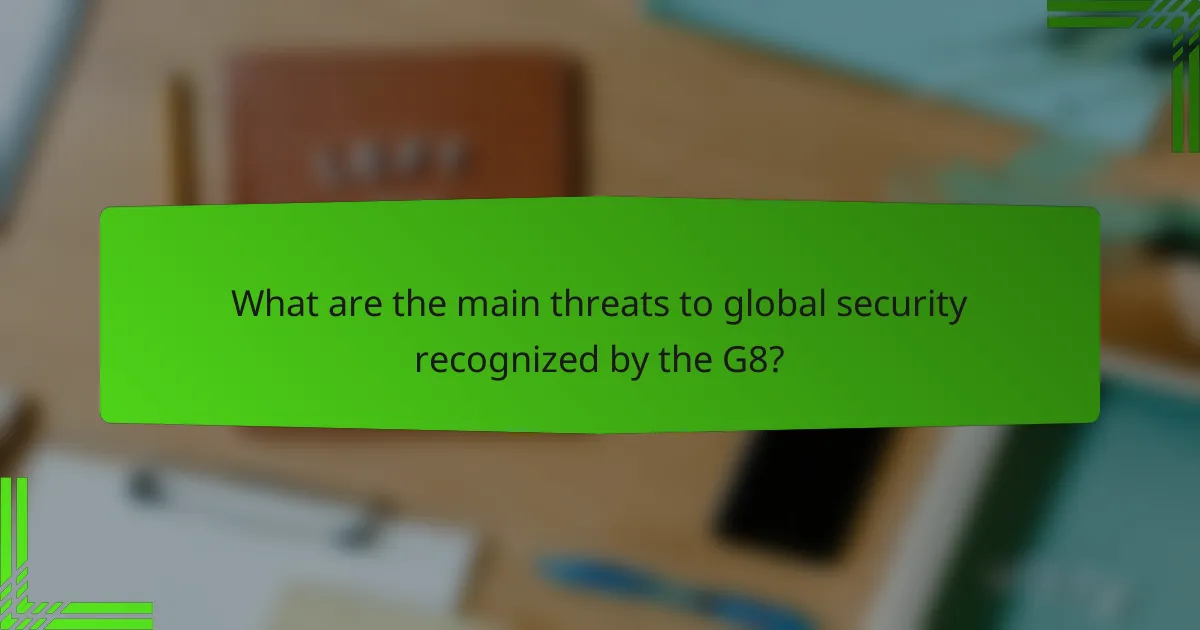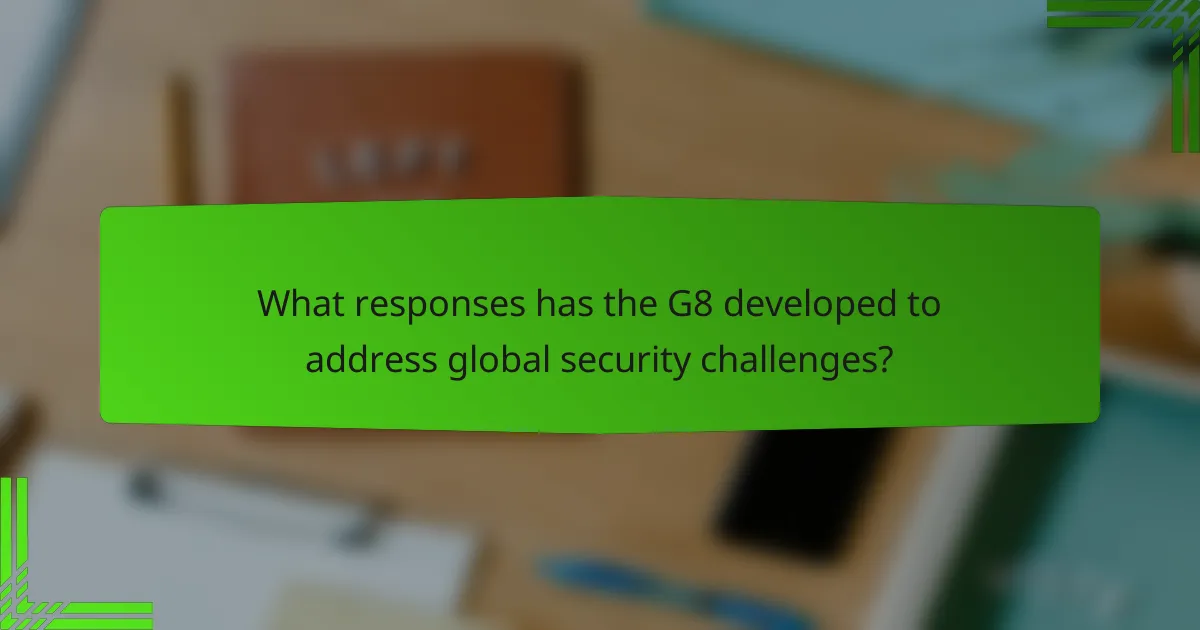The G8 Summit serves as a platform for major economies to address global security challenges through multilateral cooperation. Key threats identified include terrorism, nuclear proliferation, cyber threats, and the impacts of climate change. The summit emphasizes collective action and intelligence sharing among member states to enhance stability and security. Additionally, the G8 collaborates with international organizations like the United Nations to strengthen governance on security issues. Responses to these threats involve initiatives in counter-terrorism, non-proliferation, cybersecurity, and global health security, alongside efforts in conflict prevention and resolution.

What is the G8 Summit’s approach to global security?
The G8 Summit’s approach to global security focuses on multilateral cooperation to address international threats. It emphasizes collective action against terrorism, nuclear proliferation, and cyber security challenges. The G8 leaders discuss strategies to enhance global stability and security through shared intelligence and resources. They also prioritize conflict prevention and resolution in unstable regions. The summit serves as a platform for dialogue among major economies to coordinate responses to emerging security issues. Historical contexts, such as the post-9/11 era, have shaped their security agenda. Additionally, the G8 collaborates with international organizations like the United Nations to strengthen global governance on security matters.
How does the G8 Summit define global security?
The G8 Summit defines global security as a comprehensive framework addressing various interconnected threats. This framework includes terrorism, nuclear proliferation, and cyber threats. The G8 emphasizes the importance of international cooperation in tackling these issues. Member nations collaborate to enhance security measures and share intelligence. They also focus on promoting stability in conflict regions. The G8 acknowledges that economic stability is crucial for global security. This approach is reflected in their joint declarations and action plans. These documents outline specific commitments to enhance global security efforts.
What are the key components of global security according to the G8?
The key components of global security according to the G8 include political stability, economic security, and the fight against terrorism. Political stability is essential for maintaining peace among nations. Economic security ensures that countries can sustain development and prevent conflicts. The fight against terrorism is a priority to protect citizens and uphold human rights. These components reflect the G8’s commitment to a comprehensive approach to global security. The G8 has consistently emphasized collaboration among member states to address these challenges effectively.
How do member nations contribute to the G8’s global security framework?
Member nations contribute to the G8’s global security framework through collaborative efforts and shared commitments. They engage in discussions to address security challenges such as terrorism, nuclear proliferation, and cyber threats. Each nation shares intelligence and resources to enhance collective security measures. Additionally, member nations participate in joint training exercises and military operations. They also provide financial support for security initiatives in conflict regions. The G8 facilitates diplomatic dialogue to resolve tensions and promote stability. Historical agreements, such as the G8 Global Partnership Against the Spread of Weapons and Materials of Mass Destruction, exemplify their commitment. These actions collectively strengthen the global security framework established by the G8.
What historical context shapes the G8 Summit’s security agenda?
The historical context that shapes the G8 Summit’s security agenda includes the end of the Cold War and the rise of global terrorism. The dissolution of the Soviet Union in 1991 shifted geopolitical dynamics, leading to new security challenges. This period saw an increase in transnational threats, including terrorism and organized crime. The September 11 attacks in 2001 further intensified the focus on security at G8 meetings. Subsequent summits addressed issues like nuclear proliferation and cybersecurity. The G8’s agenda evolved to include discussions on climate change as a security threat. This historical backdrop underscores the need for collaborative security measures among member states.
What major global events influenced the G8’s security discussions?
The G8’s security discussions were influenced by several major global events. The September 11 attacks in 2001 shifted focus to counter-terrorism. The 2008 financial crisis raised concerns about economic stability and its impact on security. The Arab Spring in 2011 highlighted the need for addressing political instability. Ongoing conflicts in Syria and Ukraine have prompted discussions on international security cooperation. The rise of cyber threats has also been a significant concern in recent years. Each of these events has shaped the G8’s strategic security agenda.
How have past G8 Summits addressed security threats?
Past G8 Summits have addressed security threats through collaborative discussions and action plans. They focused on various issues, including terrorism, nuclear proliferation, and cyber security. For instance, the 2005 G8 Summit in Gleneagles emphasized counter-terrorism measures after the London bombings. The leaders committed to enhancing intelligence sharing and improving border security. In 2012, the G8 Summit in Camp David prioritized cyber security, recognizing it as a growing threat. They established frameworks for cooperation among member states to combat cyber crimes. Additionally, the G8 has regularly included discussions on non-proliferation, particularly regarding North Korea and Iran. These summits have produced joint statements and commitments to strengthen global security measures.

What are the main threats to global security recognized by the G8?
The main threats to global security recognized by the G8 include terrorism, nuclear proliferation, and cyber threats. Terrorism poses a significant risk to international stability and safety. The G8 has emphasized the need for collective action against extremist groups. Nuclear proliferation concerns arise from the potential spread of nuclear weapons. The G8 advocates for stronger non-proliferation treaties and measures. Cyber threats have increased with the rise of digital technology. The G8 recognizes the need for enhanced cybersecurity protocols to protect nations. Additionally, climate change is viewed as a security threat due to its impact on resources and migration. The G8 acknowledges that addressing these threats requires global cooperation and coordinated strategies.
Which security threats are prioritized by the G8 Summit?
The G8 Summit prioritizes several key security threats. These include terrorism, nuclear proliferation, and cyber threats. The G8 leaders recognize terrorism as a critical global issue that requires coordinated international efforts. Nuclear proliferation poses risks to global stability and security, prompting G8 nations to focus on non-proliferation treaties. Cyber threats are increasingly significant, affecting national security and economic stability. The G8 emphasizes the need for collaboration among member states to address these evolving threats effectively.
How does terrorism impact the G8’s security strategy?
Terrorism significantly impacts the G8’s security strategy. The G8 prioritizes counter-terrorism measures to address this threat. Increased collaboration among member states enhances intelligence sharing. This collaboration helps in preemptive actions against terrorist activities. The G8 also allocates resources for counter-terrorism initiatives. These initiatives focus on capacity building in vulnerable regions. Historical events, such as the 9/11 attacks, prompted a reevaluation of security protocols. The G8’s strategy now includes addressing root causes of terrorism. This comprehensive approach aims to reduce the appeal of extremist ideologies.
What role does cyber security play in the G8’s threat assessment?
Cyber security is a critical component of the G8’s threat assessment. It addresses potential risks posed by cyber attacks to national and global security. The G8 recognizes that cyber threats can disrupt economies and compromise sensitive data. In their assessments, they evaluate the capabilities of member states to defend against such threats. This includes analyzing the resilience of critical infrastructure to cyber incidents. The G8 also emphasizes international cooperation in combating cyber crime. Collaborative efforts aim to share intelligence and best practices among member countries. These measures reflect the growing importance of cyber security in maintaining global stability.
How does the G8 respond to emerging global threats?
The G8 responds to emerging global threats through coordinated policy discussions and collaborative action. This includes addressing issues such as terrorism, cyber security, and climate change. The G8 leaders meet annually to assess these threats and develop unified strategies. They share intelligence and best practices to enhance security measures among member states. For instance, the G8 has established initiatives like the Global Counter-Terrorism Forum to strengthen international cooperation. Additionally, the group emphasizes the importance of economic stability as a means to mitigate threats. Through these efforts, the G8 aims to foster a safer global environment.
What strategies are implemented to counteract new security challenges?
The G8 Summit implements several strategies to counteract new security challenges. These strategies include enhanced intelligence sharing among member nations. Collaborative efforts focus on addressing cyber threats and terrorism. The G8 also emphasizes the importance of capacity building in vulnerable regions. Joint training exercises are conducted to improve response capabilities. Furthermore, the G8 promotes public-private partnerships to enhance security measures. Regular assessments of emerging threats are performed to adapt strategies effectively. These approaches are designed to foster international cooperation and resilience against evolving security risks.
How does the G8 collaborate with other entities to enhance security?
The G8 collaborates with other entities to enhance security through initiatives and joint efforts. It engages with international organizations like the United Nations and NATO. The G8 also partners with regional bodies, including the African Union and the European Union. Collaborative efforts focus on counter-terrorism, cyber security, and non-proliferation of weapons. Regular meetings and summits facilitate dialogue and information sharing. These interactions lead to coordinated responses to global security threats. The G8’s commitment to collective security is evident in its action plans and agreements. For example, the 2005 Gleneagles Summit emphasized combating terrorism and supporting global security initiatives.

What responses has the G8 developed to address global security challenges?
The G8 has developed multiple responses to address global security challenges. These responses include collaborative efforts in counter-terrorism, non-proliferation of weapons of mass destruction, and cybersecurity initiatives. The G8 has established frameworks for intelligence sharing among member states. They have also launched programs to enhance global health security, particularly in response to pandemics. Additionally, the G8 has focused on supporting conflict resolution and peacekeeping efforts in various regions. Their initiatives often involve financial assistance and capacity building in affected countries. Each response aims to strengthen international cooperation and improve collective security measures.
What policies have emerged from the G8 Summit to enhance global security?
The G8 Summit has produced several policies aimed at enhancing global security. These policies include commitments to combat terrorism through intelligence sharing and capacity building. The G8 also focused on non-proliferation of weapons of mass destruction. Initiatives were established to strengthen cybersecurity and protect critical infrastructure. Additionally, the G8 emphasized the importance of addressing the root causes of conflict, such as poverty and inequality. Collaborative efforts were made to improve global health security, particularly in response to pandemics. The G8 Summit underscored the need for a unified approach to international crime and drug trafficking. These policies reflect a comprehensive strategy to bolster global security in various dimensions.
How do these policies address specific threats like terrorism and cyber attacks?
The G8 Summit’s policies address threats like terrorism and cyber attacks through coordinated international efforts. They enhance information sharing among member states to improve threat detection. Policies include joint training exercises for law enforcement and military personnel. They also promote the development of advanced cybersecurity frameworks. These frameworks aim to protect critical infrastructure from cyber threats. Furthermore, the G8 emphasizes the importance of counter-radicalization programs. Such programs target the root causes of terrorism. They also advocate for stronger legal frameworks to prosecute cyber crimes. These measures collectively strengthen global security against these specific threats.
What frameworks are in place for international cooperation on security?
International cooperation on security is facilitated by several frameworks. Key frameworks include the United Nations (UN), North Atlantic Treaty Organization (NATO), and the European Union (EU). The UN provides a platform for dialogue and conflict resolution among member states. NATO focuses on collective defense and military cooperation among its members. The EU promotes security through political and economic collaboration. Additionally, regional security organizations like the African Union (AU) and the Organization of American States (OAS) contribute to localized security efforts. These frameworks establish norms and protocols for collaboration on security issues, enhancing global stability.
How effective are the G8’s responses to global security threats?
The G8’s responses to global security threats have been moderately effective. The G8 has addressed issues such as terrorism, nuclear proliferation, and cybersecurity. For example, the G8 adopted the Global Partnership Against the Spread of Weapons and Materials of Mass Destruction in 2002. This initiative aimed to secure nuclear materials and prevent terrorism. Additionally, the G8 has facilitated international cooperation on intelligence sharing. This collaboration has improved responses to specific threats. However, challenges remain in achieving consensus among member nations. Disparities in national interests can hinder unified action. Overall, while the G8 has made strides, effectiveness varies by issue and context.
What metrics are used to evaluate the success of G8 security initiatives?
Metrics used to evaluate the success of G8 security initiatives include the number of joint operations conducted and the effectiveness of information sharing among member countries. These metrics assess collaboration and operational outcomes. Additionally, the reduction in terrorist incidents and improved border security are critical indicators. Statistical analysis of crime rates and security incidents provides concrete evidence of effectiveness. Furthermore, feedback from member nations on policy implementation is also considered. These metrics collectively help gauge the overall impact of G8 security initiatives on global safety.
How do member countries assess the impact of the G8’s security measures?
Member countries assess the impact of the G8’s security measures through various evaluation methods. These methods include analyzing intelligence reports and security statistics. They also conduct joint assessments during G8 meetings. Member countries share data on terrorism incidents and security breaches. This collaborative approach helps identify trends and effectiveness. Additionally, they use feedback from law enforcement agencies. Surveys and studies on public perception of security measures are also conducted. Regular reviews of policy outcomes inform future security strategies. This systematic assessment ensures accountability and continuous improvement of security protocols.
What best practices can be derived from the G8 Summit’s approach to global security?
Best practices derived from the G8 Summit’s approach to global security include fostering international cooperation and establishing clear communication channels. The G8 emphasized collaborative efforts among member nations to address security threats. This cooperation led to coordinated responses to issues like terrorism and cyber threats. The summit also highlighted the importance of sharing intelligence and resources among nations. Additionally, the G8 encouraged the development of joint training programs for security personnel. This approach aimed to enhance preparedness and response capabilities across borders. Regular assessments of global security challenges were also advocated. These assessments help in adapting strategies to evolving threats effectively.
The G8 Summit serves as a pivotal entity in addressing global security challenges through multilateral cooperation among major economies. This article outlines the G8’s comprehensive framework for defining global security, emphasizing key components such as terrorism, nuclear proliferation, and cyber threats. It examines how member nations contribute to collective security efforts, the historical context shaping the G8’s agenda, and the strategies implemented to counter emerging threats. Additionally, the article highlights the effectiveness of G8 responses and best practices derived from their approach to enhancing global security.